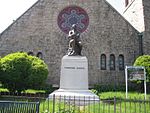Brook Farm, also called the Brook Farm Institute of Agriculture and Education or the Brook Farm Association for Industry and Education, was a utopian experiment in communal living in the United States in the 1840s. It was founded by former Unitarian minister George Ripley and his wife Sophia Ripley at the Ellis Farm in West Roxbury, Massachusetts (nine miles outside of downtown Boston), in 1841 and was inspired in part by the ideals of transcendentalism, a religious and cultural philosophy based in New England. Founded as a joint stock company, it promised its participants a portion of the farm's profits in exchange for an equal share of the work. Brook Farmers believed that by sharing the workload, they would have ample time for leisure and intellectual pursuits.
Life on Brook Farm was based on balancing labor and leisure while working together for the greater community's benefit. Each member could choose whatever work they found most appealing and all were paid equally, including women. Revenue came from farming and from selling handmade products like clothing, as well as fees paid by the farm's many visitors. The main source of income was the school, which was overseen by Mrs. Ripley. A preschool, primary school, and a college preparatory school attracted children internationally and each child was charged for his or her education. Adult education was also offered.
The community was never financially stable and had difficulty profiting from its agricultural pursuits. By 1844, the Brook Farmers adopted a societal model based on the socialist concepts of Charles Fourier and began publishing The Harbinger as an unofficial journal promoting Fourierism. Following his vision, the community began building an ambitious structure called the Phalanstery. When the uninsured building burned down, the community was financially devastated and never recovered. It was fully closed by 1847. Despite the commune's failure, many Brook Farmers looked back on their experience favorably. The commune's critics included Charles Lane, founder of another utopian community, Fruitlands. Nathaniel Hawthorne was a founding member of Brook Farm, though not a strong adherent of the community's ideals. He later fictionalized his experience in his novel The Blithedale Romance (1852).
After Brook Farm closed, the property was operated for most of the next 130 years by a Lutheran organization, first as an orphanage, and then a treatment center and school. Fire destroyed the Transcendentalists' buildings over the years. In 1988, the State of Massachusetts acquired 148 acres (60 ha) of the farm, which is now operated by the Massachusetts Department of Conservation and Recreation as a historic site. Brook Farm was one of Massachusetts's first sites to be listed on the National Register of Historic Places and be designated a National Historic Landmark. In 1977, the Boston Landmarks Commission designated Brook Farm a Boston Landmark, the city's highest recognition for historic sites.











